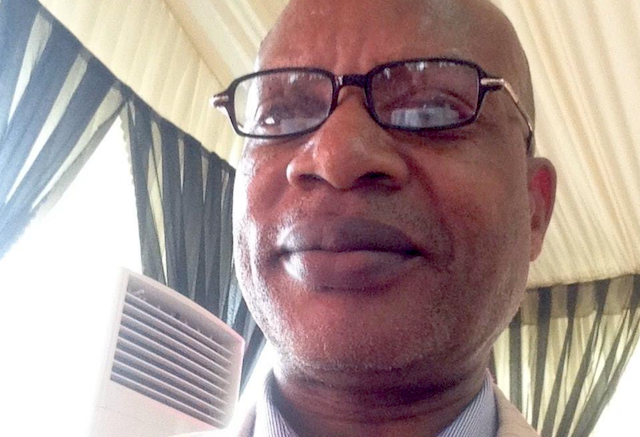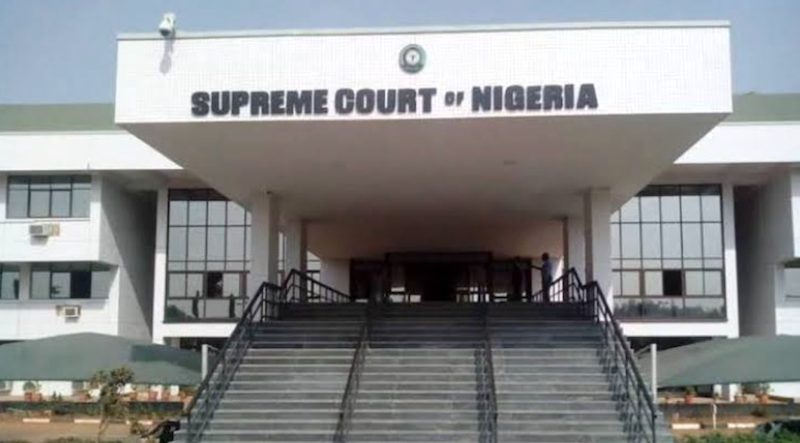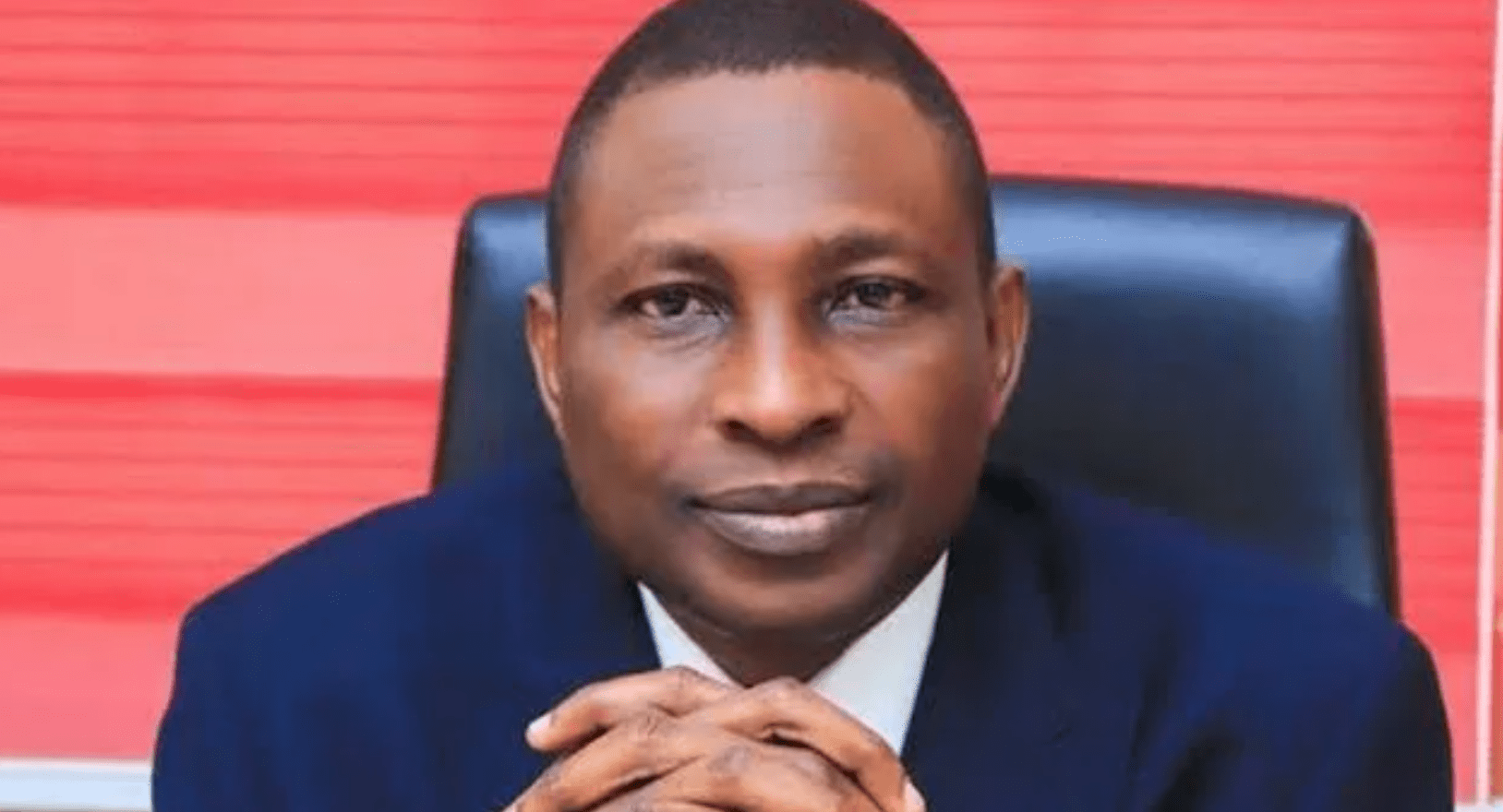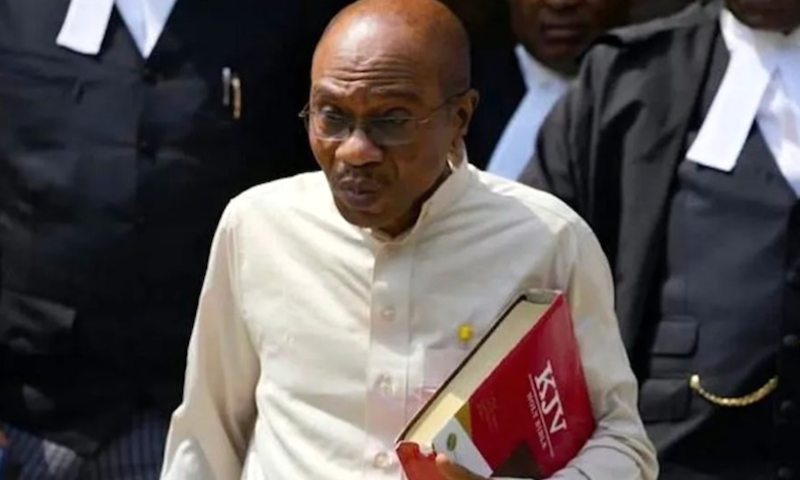Strange things happen in Nigeria, one of the latest being a suit purportedly filed by Lagos State Governor Babajide Sanwo-Olu, to prevent the Economic and Financial Crimes Commission (EFCC) from investigating, arresting, detaining or prosecuting him or his aides after his eight-year tenure of office in 2027.
However, the Lagos Attorney General and Commissioner for Justice, Lawal Pedro (SAN), has debunked the widely-publicised suit, saying Sanwo-Olu neither sued nor authorised any legal practitioner to file a suit on his behalf concerning the matter, adding that the EFCC isn’t investigating the governor and hasn’t invited him or threatened to arrest any of his staff, domestic or otherwise.
The odder and curiouser angle to the alleged pre-emptive writ at the Federal High Court in Abuja is that it’s filed in June 2024, almost three years ahead of Sanwo-Olu’s terminal governance of Nigeria’s commercial capital, the richest State in the Federation, and the fifth largest economy in Africa as of 2022 GDP figures, which Sanwo-Olu’s pledged to advance further by 2027.
Thus, the suit is a new one on Nigerians, as the proverbial bridge is way too far off – 36 months to Sanwo-Olu’s end of tenure – to attempt to cross before getting there! Snapets from EFCC’s moves against outgoing governors are telegraphed a few months or weeks before they bow out of office, so giving them the jitters. They either begin to express being squeaky clean, alleging political witch-hunt or daring the EFCC to carry out its threat to make them account for their stewardship.
Since democracy returned in Nigeria in 1999, a few ex-governors have escaped overseas and were forced to return to Nigeria to face prosecution; many have remained in the country to face the EFFC and years of legal ordeal; a couple of them, such as former Ekiti State Governors Ayo Fayose and Kayode Fayemi, have presented themselves to the commission for interrogation and/or prosecution.
Some former governors have engaged in a hide-and-seek, for instance, Yahaya Bello of Kogi State, who’d gone underground for months only to unexpectedly show up at the EFCC headquarters in Abuja in October 2024, and yet wasn’t booked, interrogated, or detained having been on the wanted list of the EFCC and the courts; two have been tried, jailed and served their sentences; one was tried and jailed but his sentence overturned on appeal and was released from prison; while one was tried overseas and served his sentence before returning to the country.
Lately, the EFCC threat to investigate, arrest, detain or prosecute former governors has become mostly academic, and the norm rather than the exception. It appears some ex-governors now relish being dragged by the EFCC, at least, as a way to keeping themselves in the news after missing the years of free spotlighting.
But even as Sanwo-Olu’s reported counsel, Darlington Ozurumba, sues the EFCC as sole defendant over the said threat to arrest, detain and prosecute the governor after his tenure, the EFCC has denied knowledge, contemplation or plans by the commission or any of its officers to harass, intimidate, arrest or prosecute Sanwo-Olu after May 29, 2027.
As reported by The News Agency of Nigeria (NAN), when the matter was called for mention on October 29, Ozurumba informed the court that he’d withdrawn the earlier originating summons, and that the EFCC had been duly served with the latest court documents, which the commission’s counsel, Hadiza Afegbua, said she’s yet to sight, even as the proof of service of the processes wasn’t in the court file, and Justice Abdulmalik adjourned the matter to November 26 for further mention.
In an originating summons, marked: FHC/ABJ/CS/773/2024, dated and filed on June 6, Sanwo-Olu, reportedly raising seven questions and seeking 11 reliefs, prays for a declaration that, under and by virtue of the provisions of Section 37 of the amended 1999 Constitution, “the plaintiff, as a citizen of Nigeria, is entitled to right to private and family life as a minimum guarantee encapsulated under the Constitution, before, during and after occupation of public office created by the Constitution.”
Besides craving a declaration that, upon community reading of the provisions of Sections 35(1) & (4) and 41(1) of the Constitution, the threat of his investigation, arrest and detention by the EFCC during his tenure of office as governor is illegal, Sanwo-Olu allegedly prays the court to declare that the incessant harassment, threat of arrest and detention against him upon the EFCC’s instigation by his political adversaries based on false and politically-motivated allegation of corruption, is a misuse of executive powers and abuse of public office.
Hence, he purportedly seeks, among others, an order restraining the EFCC from harassing, intimidating, arresting, detaining, or prosecuting him in connection with his tenure as the governor of Lagos State.
However, the EFCC, describing as speculative and a conjecture the alleged Sanwo-Olu’s claims and reliefs in his fundamental right enforcement suit, has denied it threatened, invited or took any step at all to encroach on the governor’s right to freedom of movement or violated his right to private and family life and personal liberty.
Countering the originating summons Ozurumba purportedly filed on behalf of Sanwo-Olu, the EFCC, in an affidavit filed on October 31 by its lawyer, Hadiza Afegbua, the deponent, Ufuoma Ezire, told Justice Joyce Abdulmalik of the Federal High Court, Abuja, that the plaintiff’s depositions in Paragraphs 4, 5, 6, 7 and even 8 are unfounded, untrue and unknown to the defendant, and calculated to mislead the court, and are hereby denied.
Noting that the EFCC isn’t investigating Sanwo-Olu, and has never invited him or threatened to arrest any member of his staff, domestic or otherwise, Ezire states that the EFCC invites members of the public for interview, interrogation or any engagement vide a written invitation, phone calls or text messages by any of its officers, who shall introduce themselves by name, rank, designation, and section to enable the invitee trace the officer easily.
Ezire says the EFCC is unaware of any threat to arrest Sanwo-Olu’s “aides, accusation of maladministration or diversion of Lagos State’s funds nor is it aware of any likelihood of a breach of the applicant’s right to liberty or right to own movable and immovable properties in this case.”
Stressing that there’s no petition or any intel gathered before the EFCC to warrant its officers to invite, or threaten to arrest the plaintiff at the moment, Ezire asserts that the entirety of the alleged Sanwo-Olu’s dispositions isn’t true, as the application is “misconceived and brought in bad faith to mislead this honourable court,” adding that, “it will be in the interest of justice to refuse the reliefs sought by the plaintiff.”
Similarly, Mr Pedro, the Lagos Attorney General, in a statement on October 29 rebutting “the news circulating in a section of the media, titled: ‘Sanwo-Olu sues EFCC over alleged plan to arrest, prosecute him after tenure,’” clarified as follows:
“Mr Babajide Sanwo-Olu, at no time, sued or briefed any legal practitioner to file a suit on his behalf concerning the above subject matter. Moreover, it is implausible for the Governor, who enjoys immunity as conferred by the Constitution, and has almost three years remaining in office, to engage any lawyer on this matter.
“To the best of my knowledge, my inquiry confirmed that the EFCC is not investigating the governor and has never invited him or threatened the arrest of any member of his staff, domestic or otherwise. We are currently investigating how the case came to be without our knowledge.
“For the avoidance of doubt, Mr Babajide Sanwo-Olu has demonstrated exemplary service delivery and prudent, judicious management of public resources. Therefore, Mr Babajide Sanwo-Olu, who is tirelessly working to improve the living conditions of all Lagosians, has no cause for concern when he eventually leaves office at the end of his tenure in May 2027.
“We, therefore, urge media organisations to be cautious about the reports they publish on their esteemed platforms to avoid misleading the public.”
Needless to ask: Whodunit? Who sponsored it? Without a doubt, the so-called Sanwo-Olu’s suit, filed by an “unauthorised legal practitioner,” against the EFCC is the handiwork of his political adversaries trying to induce, instigate or coerce the anti-graft agency to embark on a fishing expedition it’s no reasonable grounds for, either from a petition(s) or intel that points to a likelihood of (mis)appropriation of funds and resources of Lagos by the governor or his aides.
That said, many will defend Governor Sanwo-Olu for perceptively seen as deploying the resources at his disposal to upgrade and develop existing and new infrastructural and human capital needs to match the Lagos motto of “The State Of Excellence” and its Mega City status that’s attracted unprecedented public and private investments.
These include the Lagos Metropolitan Area Transport Authority (LAMATA-) managed ground-breaking Blue and Red Rail Lines, the Bus Rapid Transport (BRT) system, the proposed Fourth Mainland Bridge, the Atlantic City project, the fully-automated Imota Rice Mill, and the Lekki Free Trade Zone that houses the multibillion dollar 650,000bpd-capacity Dangote Petroleum Refinery – the largest single-train refinery in the world at full capacity – which’s Nigeria’s window to self-sufficiency in production and supply of petroleum products.
Other areas in the Lagos socio-economic sphere: Education, ICT, innovation and technology, healthcare, commerce, agribusiness, small-scale industries, entertainment, showbusiness, tourism, and youth and sports development are receiving adequate attention, and have become a source of pride to Lagosians, and emulation by other States in Nigeria.
Lagos, a hub of international engagements all-year-round, has moved up the ladder as one of the most preferred destinations on the continent of Africa, and is up-scaling on the global leisure spots, thanks to Governor Sanwo-Olu and his vastly young, professional, dynamic and dedicated team, who’ve deployed their expertise in various fields to achieve a shared dream of Lagos leading or being among the best in all human endeavours.
Sanwo-Olu isn’t just a workaholic delivering on the promises of his administration, but he’s the epitome of the alias, “Mr Project,” in the true sense of the lingo in our clime. So, why should he be worried about the EFFC when he’s deploying the resources of Lagos to develop the state to an enviable standard! The “amiable” governor should free his mind and continue “to finish strong” with the good works he’s been doing, for which he’s received unblemished praises, accolades and awards within and outside Nigeria.
Mr Ezomon, Journalist and Media Consultant, writes from Lagos, Nigeria.






